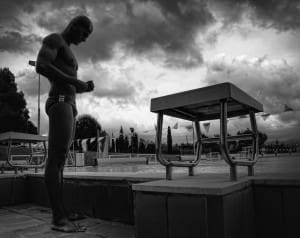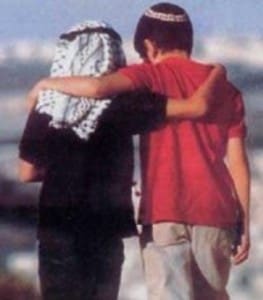I have to be honest: I don’t like sports. I’m just not interested in watching other people play games. But Amani Awartani, coach of the Palestinian Olympic swim team, weaves a story of gender, international politics, cultural pride, and personal challenge. Through her eyes, I see the upcoming Olympics as a significant milestone for Palestinians and the rest of the world – and a lot of fun.
Did you know that Palestine was recognized by the International Olympic Committee in the 1930s? That Palestine is listed on the official website of the Olympic movement? That there is a Palestinian Olympic Committee?
In fact, this is the fifth time that Palestinians have taken part in the Olympics, the first being in 1998. Since Palestine isn’t a state, Palestinians have to compete in the World Championships that are held before the Olympics and win points that make them eligible as “participants.” Until now, all the Palestinian competitors have been swimmers.

“This is the first year we have a ‘qualified’ competitor,” Amani explains. Maher Abu Rmaileh from Jerusalem competes in Judo. She adds quickly, “You can still win a medal if you participate by winning points and are not considered a qualified competitor.”
Since there are Palestinians all over the world, I asked Amani if Palestinians in the diaspora can swim with the Palestinian team. “Sometimes we are contacted by Palestinians in the US or elsewhere who want to swim with us. It is allowed as long as they aren’t registered as swimmers in another country But generally we refuse, even if they might bring us medals. We want to give local people a chance first.” Her voice trails off as she adds, “Maybe later we could include them in the national team, but how could we support them without funding?”
Although she is coach of the Palestinian Olympic swim team, Amani doesn’t actually train the Palestinian competitors for the Olympics. Ahmed Gebrel, a Palestinian refugee in his twenties who lives in Egypt and Sabine Hazboun, who is only eighteen years old, have been living and training in Barcelona. “Sabine missed her Tawjihi, the last year of high school, in order to train,” Amani said, clearly proud of Sabine’s commitment. Expenses, including funding for their coaches, were provided by the Olympic Solidarity Committee. But next year they’ll have to raise funds themselves.

Amani tells the story with such enthusiasm, I nearly pulled out my wallet to make a contribution. In fact, I was so taken by her passion, I almost jumped onto the table at the Zaman Cafe in Ramallah where we were talking to do a little cheer.
“Although this is voluntary work, I want to do my job 100%. We’re a team. I want the team members to know I am always there for them. I tell them: ‘You swim, and I’ll take care of the rest,’” Amani says.
Amani’s own children enjoy swimming. Her son used to sneak into Jerusalem to swim, since he doesn’t have a permit, but he didn’t want to pursue it competitively. Her daughter enjoys recreational swimming, but is more serious about football and, more recently, ballet.
“Everybody has his own thing. As for me, I find it a tremendous honor for us to be standing in front of the world, recognized as Palestinians. It’s overwhelming.”
But the best part of this story is yet to come! Do you know what a feeding stick is? Check back here to find out.















